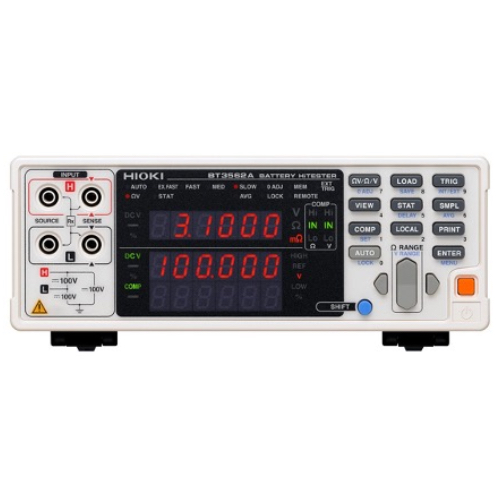The importance of battery testing equipment in laboratory research and product development
Battery testing equipment is essential in laboratories and product development to evaluate the performance and characteristics of batteries. There are several types of battery testing devices, and they are used in different ways, depending on the specific testing needs.
- Battery analyzers: Used to test the capacity, voltage, and internal resistance of a battery. They can also be used to analyze the charge and discharge characteristics of a battery and detect defects or problems.
- Impedance spectroscopy analyzers: Used to test the impedance of a battery at different frequencies, which can provide information on the internal resistance, charge transfer resistance, and capacity of the battery.
- Thermal chambers: Used to test the temperature performance of a battery, including the impact of temperature on battery capacity, cycle life, and safety.
- Environmental chambers: Used to simulate various environmental conditions, such as humidity, temperature, and vibration, and to evaluate the impact of these conditions on battery performance and safety.
- Cyclers: Used to test the cycle life and charge/discharge characteristics of a battery over multiple cycles, which can provide information on the durability and longevity of the battery.
Battery testing equipment is essential in the development and evaluation of batteries, allowing researchers and engineers to assess the performance, safety, and reliability of batteries under various conditions and to develop new battery technologies that meet specific requirements.
Importance of high-precision battery testing equipment
The precision of battery testing equipment is important for several reasons:
- Data accuracy: High-precision battery testing equipment provides accurate data on battery performance that is crucial for product development as it allows developers to make informed decisions about design, materials, and manufacturing processes.
- Consistency: High-precision battery testing equipment ensures that the same tests are performed consistently across multiple batteries, reducing the variability in the data. This consistency allows developers to compare results between different batteries and make meaningful conclusions about performance.
- Cost savings: Accurate battery testing data can help developers identify potential issues early in the development process, saving time and money by preventing expensive design flaws and production mistakes.
- Safety: High-precision battery testing equipment can help identify potential safety hazards, such as overheating or short-circuiting, before they occur. This allows developers to address these issues before the batteries are put into use, ensuring safety.
Energy storage and battery testing solutions
Battery testing is a critical component in the development, design, and operation of energy storage systems. Here are some of the ways in which battery testing helps provide energy storage solutions:
- Performance optimization: Battery testing provides valuable data on battery capacity, power output and efficiency. This data helps optimize the performance and minimize the cost of energy storage systems.
- Safety assurance: Battery testing ensures that energy storage systems are safe to use. By testing for potential safety hazards such as overheating, short-circuiting and thermal runaway, battery testing helps identify potential safety issues before they occur, allowing designers to make necessary changes to ensure that energy storage systems are safe.
- Quality control: Battery testing helps ensure the quality of energy storage systems by testing batteries for consistency, reliability, and durability. This helps identify potential manufacturing defects and ensure that energy storage systems meet performance and safety standards.
- Lifespan extension: Battery testing helps extend the lifespan of energy storage systems by providing data on battery aging, degradation, and wear. This data helps identify potential factors that could reduce battery life and allows designers to make necessary changes to extend the lifespan of energy storage systems.
- Cost reduction: Battery testing can help reduce the cost of energy storage systems by identifying opportunities to improve efficiency and reduce waste.
How to evaluate battery testing equipment
When evaluating battery testing equipment, there are several factors to consider, such as:
- Accuracy: The accuracy of the equipment is crucial as it determines the reliability of the results.
- Testing range: The testing range is important because it determines the types of batteries that can be tested with the equipment.
- Speed: The speed of the equipment is also important, especially if you need to test a large numbers of batteries quickly.
- Ease of use: The equipment should be easy to use, with clear instructions and a user-friendly interface. This helps minimize errors and ensures that the testing process is smooth and efficient.
- Portability: If you need to test batteries in different locations, look for equipment that is lightweight and portable.
TMetrix battery testing equipment for laboratories and product development
TMetrix offers a range of high-precision battery testing equipment for laboratories and product development. Click here to review our product offerings.

